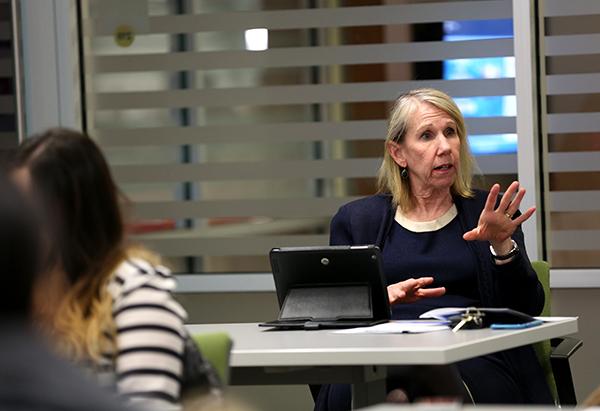GW’s head librarian began to lay out a plan for Gelman Library and other campus resources to students this week, explaining how she hopes to expand the system’s reach in the next seven years.
University Librarian Geneva Henry is looking to train librarians to better assist faculty and students with research. She said after a town hall meeting with students Tuesday that she also wants to grow special collections in subject areas that have an interdisciplinary focus and create more student space in Gelman Library, which could mean moving materials off campus.
“We are all excited about the strategic plan because it really does position us to be more proactive and we are not just a place where we sit back and wait for you to come ask questions,” she said in an interview. “We really want to be a partner and collaborator with you in moving forward.”
The plan will build on the themes of GW’s strategic plan, which focuses on elevating the University’s research profile, investing in teaching and learning practices by hiring top-tier faculty and solidifying a place in the global conversation about higher education.
Ronella Rosenberg, the Gelman student liaison, presented the plan that she and Henry are working to create at two separate town hall sessions with students Tuesday. Many of the ideas she suggested, like laying out a master plan for potential renovations to Gelman and increasing training in areas like data mining and visualization, were ideas Henry introduced during her first year at GW.
Rosenberg said increased donations to the library would be necessary to carry out the plans. Budgets across campus have seen cuts as graduate enrollment has declined and the University has spent more than projected.
The library received its first collections budget increase in a decade this year, making it one of just three divisions to see a funding increase. But that money only covered the cost of inflation so Gelman did not have to cut any subscriptions.
“A lot of this is donor dependent in that we are not going to be able to redesign the entire building in a year,” Rosenberg said. “It is going to take some time and some support, and we are asking for your patience and understanding that a plan is in place and your concerns are not being ignored.”
With more specific ideas about potential renovations or new collections, library officials can pitch particular gift opportunities to potential donors, Henry said.
Henry also hopes the library will start to help researchers identify new grant funding opportunities. She said offering more training for staff members to master communicating information through graphs and geospatial presentations could help them work more closely with faculty and students.
“Being able to provide more workshops and training in data mining visualization and GIS types of activities, enabling students to make movies and do digital storytelling because these are all skills that when you leave here you really ought to have,” Henry said.
Rosenberg and Henry are looking at how the library can use space more wisely. The first floor lost student space this year after Gelman acquired materials from the Corcoran’s library.
GW already invested $16 million in renovations to Gelman’s second floor, which were completed last year.
Thirty-five students attended the pair of town hall sessions, and some said they’d like to see new collections and fewer paywalls so they can access more sources online.
Henry surveyed students to find out what types of new furniture they’d want to see in the library last year, a method she said she would use again to learn about student needs.
“We did some quick surveys, and it was really clear the students wanted individual study spaces, so as we move forward we’ll do exactly that same thing before we as librarians make decisions,” she said.







